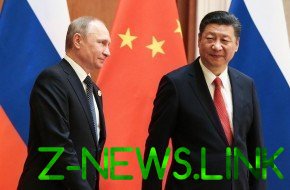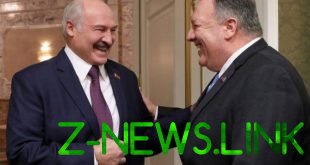
The XI Jinping’s visit to Russia has the status of a state. But as said, meeting him in the Kremlin, Vladimir Putin, is not as important a status as the opportunity to meet again. The two presidents communicate more than regularly. Three dozen meetings over six years – an absolute record: over the previous 64 years of relations between China and Russia was hardly less.
The Chinese President named Putin as his closest friend – but can we trust the words of friendship in international relations?
Putin and XI Jinping will hold together for almost three days – Wednesday in Moscow, and Thursday and Friday in St. Petersburg. In the Kremlin has been said many words about the unprecedented nature of the relations between the two countries, that there are no limits to improve them. And even more would be said at an economic forum in the Northern capital. But the main words we need to recognize those that said XI Jinping at the signing of joint documents:
“President Putin has established a close working relationship and deep personal friendship. Over the past six years we have met almost thirty times. Russia is for me the most visited by the foreign government and the President Putin, for me the most dear friend and good colleague”.
The same idea was expressed the day before in interview to the Russian press – and there she was more deployed:
“Among the foreign colleagues, the President Putin, for me is the closest and most reliable friend, very dear to me profound friendship with him. Our communication is based on deep mutual trust and sincere friendship. We respect and understand each other, trust each other. We have similar views on the world process and the matching concept in public administration. On our shoulders the historical mission of national revival”.
Of course, usually such statements appreciate the condescending etiquette, diplomatic politeness, the ceremony (and even Chinese), know, like, we the price of all these words. In Russia there is a traditional wariness towards any statements of foreign leaders about the friendship with us, as, indeed, to reverse the assurances of our leaders. It is clear that this is largely due to the fact that in 90-e years of the Boris Yeltsin called Clinton his “friend bill”. And then this bill bombed Belgrade.
Putin rarely uses the word “friend” to characterize their relations with foreign leaders, preferring to be called so have left a leadership chair colleagues, for example, Silvio Berlusconi and Gerhard Schroeder. In relations with Hu Jintao, predecessor of XI, which took almost a decade of personal friendship also sounded. And only after the appearance of the tandem Putin – si mention of a personal friendship has become mandatory in almost every meeting.
Yes, initially it was the expression of sympathy and a desire to demonstrate commitment to the development of bilateral relations. But then between the two heads is really a “personal chemistry”, the obvious sympathy which seriously helps the rapprochement of the two countries. Based on what?
First and foremost, of course, the coincidence of views between Putin and XI on the future of their own countries and of international relations – and how important to achieve that a strong relationship between the two countries. Russia and China are building a post-American world together, complementing and helping each other. Needless to say, that everyone in this tandem primarily concerned with its own country – its strength, security, profit, interests. But the interests of the other party is not in the mode of forced concessions, and through the attempt of finding the best profitable for the two countries variants. Yes, it is very difficult and long, Yes, there are many obstacles to overcome as an objective, including the geopolitical and subjective, that is emotional and human. But is the main condition of success: understanding the huge benefits that gives the two countries together. And personal trust of the two leaders – both human and political.
If the roots of political trust is clear, the reasons for which it has established trust relationships, at first glance harder to understand. Yes, Putin and XI are almost the same age, they grew up and developed under the Communist system, but they have very different personality types, different life experiences, different path to power. Not to mention the fact that they belong to different, although the great cultures and civilizations (although the ethics of the Chinese and the Russians, in fact, far more common than many people think). However, they have a very important thing in common – sincerity, that is, the ability to speak openly and honestly. And this allows two strong leaders not just to find a common language, but also to trust each other. Trust in politics is a priceless thing that cannot be replaced by any simulacra.
Of course, neither Putin nor XI never forget that their relationship, is the relationship of the two States. We are talking about political friendship, just augmented by human sympathy. About any and reckless can be no question – personal trust is verified by political practice, that is, concrete actions that make both parties for the development of bilateral relations and on the world stage. And then Russia and China are in agreement: not just all of the key points (Syria, Iran, North Korea, and now Venezuela), but also on strategic issues.
We need to reassure those in Russia or China, does not believe in the strategic nature of relations between the two countries and is waiting for a trick from “the crafty Russian” or “cunning Chinese”, and even to strike back. Putin and XI have no reason to lie to each other, even if we imagine that they would have wanted. Because they receive from the trust relationship is much bigger and more serious than what you can obtain from cheating. Putin sees that si is sure to benefit China’s close relations with Russia, and C sees the same confidence of Putin.
It is clear that two such large, besides neighbouring countries, simply can not have different concerns against each other: from complexes acquired historical experience, to all sorts of contrived fears and natural fears.
The Russian elite traditionally Western-oriented, generally poorly know and understand China, which is being used by opponents of our rapprochement, playing catafalque topics, including “China’s going to take over, China will acquire all shares”.
The Chinese elite, in turn, often suspects Russia of double play: the insincerity of the policy of rapprochement that Moscow just involuntarily turns to the East, faced with pressure from the West. And if Washington beckoned, can return to the “Big eight”, sacrificing relations with China.
Both are deeply mistaken. Putin’s decision to turn to the East is in the strategic interests of Russia, as well as building a long-term relationship with China. This course of the 21st century that will allow us to rebuild the entire system of international balance of power, to close the “Atlantic century”.
Chinese expansion to Russia is as far-fetched subject. Strong and she along with China, Russia to Beijing, far better than any mythical variants with “return of Primorye in the case of disintegration of Russia”. As for the West – because his age ends. And together with China, Russia will deploy Europe from the Atlantic to Eurasia.
Russians can believe the Chinese, the Russian and the Chinese precisely because they are profitable to work together, mutually beneficial. And the confidence of the leaders is a huge plus and accelerator of our relationship.
Moreover, the experience of Russian-Chinese relations shows how much it depends on the human factor. If you take 70-year period since the founding of the PRC (and this year marks the anniversary of new China, and the anniversary of our relationship), we will see how much I affect them as our leaders.
In the history of Soviet-Chinese relations were only two pairs: the Stalin –Mao and Khrushchev – Mao.
The two leaders met only once – during a visit by Mao to Moscow in December 1949. However, the visit lasted two months, and meetings were few, but their relationship was complicated and unusual. They made a full-fledged military and political Alliance, for the first time in the history of the two countries became close allies.
In the 50s it seemed that the Union of Moscow and Beijing will change the world: communism will overcome capitalism, the East will overcome the West. Everything in the world had confirmed it. The West lost control of the world, Asia and Africa went from under his feet. At the same time China was poor and devastated by decades of civil war and war with the Japanese. And the Soviet Union was a superpower because of the imaginative fear of which the Americans were digging bomb shelters. The USSR helped China and the two countries had common goals in the global arena.
But the relationship between Khrushchev and Mao did not happen, though they had several meetings throughout five years. From 1954 to 1959, they communicated five times – three of Khrushchev’s visit to Beijing and two to Mao in Moscow. Long conversations and discuss issues of geopolitics has not led to the establishment of mutual trust: Khrushchev did not know and did not understand China, Mao Khrushchev didn’t respect and trust him.
After the visit of Khrushchev in the United States, Mao decided that Moscow refuses to fight for the world revolution. The USSR was a traitor – China wanted to retaliate against the West for centuries of humiliation for the intervention and the opium war, to regain the position of world leader, and thought the Russians are also serious confrontation with the West as they are. And then Khrushchev suddenly builds bridges with America.
In the end, the quarrel of the two countries first formally ideological, and then and open confrontation, which reached its maximum in 1969 at Damanski. For nearly three decades relations between the two countries was frozen and began to thaw only in the mid-80s. But then didn’t. By the time of Gorbachev’s visit in 1989 in Beijing, neither of which the establishment of a trusting relationship between him and Deng Xiaoping could not be and speeches: the Soviet Union collapsed, and China, studying including our mistakes, gaining speed reforms.
In the 90 years of the Yeltsin and Jiang Zemin was a good relationship – they liked each other. But Russia was on the verge of collapse, and in geopolitical terms openly oriented to the West. Only in the last couple of years of the last century Moscow began to demonstrate independence: became Prime Minister Primakov has always advocated the creation of an axis Moscow – Delhi – Beijing. In the last month of his reign, Yeltsin from Beijing even threatened Clinton – like, say, my friend and Jiang Zemin decide the way it is. Looked it is a pity that Russia was in a state little better than Yeltsin himself.
But when Russia began to get out of a collapse, Beijing is not in a hurry to trust Moscow. Putin a few years spoke to Jiang, then came the period of Hu Jintao – when it was evident that Russia comes into serious dissent with the United States. But owing to the personal qualities of the Hu, and then the nature of Chinese collective leadership (kept a large influence of Jiang Zemin), and, of course, owing to the General tactics of the then China (to keep a low profile on the international stage, to be invisible), no trust and close personal relations of Putin and Hu Jintao did not happen.
But when, in the fall of 2012, the General Secretary of the CPC Central Committee, was elected President of China XI Jinping, everything became clear. Because over the period of the constant change of Chinese leaders (with Hu acted an age limit, not actually allowed to be a Secretary for more than 10 years, and with the advent of si, it became clear that for a long time this rule won’t last) – and be able to build strategic plans for the decades ahead, knowing that the Chinese leader also considers the long term.
Because of the nature of XI Jinping, it was clear that he seriously and permanently, that he would himself make decisions, and that it is possible to go “American”. That is, the building of a new, postatlantis postzapadnoy world order on something like Mao and Stalin, and what were unable to agree Mao and Khrushchev.
© 2019, paradox. All rights reserved.





